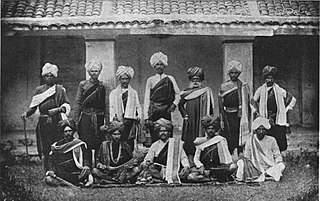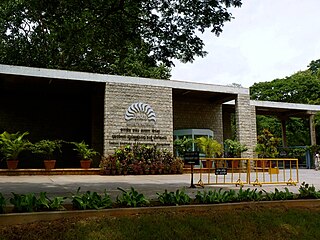
University of Visvesvaraya College of Engineering (UVCE) was established in 1917, under the name Government Engineering College, by Bharat Ratna Sir M. Visvesvaraya. It is the fifth engineering college to be established in the country and first in Karnataka. UVCE is one of the few technical institutions in the country that is vested with the status of a university and autonomy on the lines of IITs. It is one of the oldest technical institutions in the country, imparting technical education leading to B.Tech., B. Arch., M.Tech., M. Arch. and PhD degrees in the various disciplines of Engineering and Architecture. The college is approved by the AICTE and the Government of Karnataka. UVCE has secured an NAAC accreditation score of 3.17. The college used to receive financial aid under the TEQIP program from the World Bank.

Visvesvaraya Technological University (VTU), previously spelled Visveswaraiah Technological University, is a collegiate public state university in Belagavi, Karnataka established by the Government of Karnataka. All colleges in the State of Karnataka imparting education in Engineering or Technology, except those that have the consent of VTU and sanction of the Government, are required to be affiliated with Visvesvaraya Technological University, Belagavi. The university is named after Sir M. Visvesvaraya, an Indian civil engineer, statesman and the 19th Diwan of Mysore. VTU is one of the largest technical universities which provides opportunities for engineering students and management students.

Chintamani Nagesa Ramachandra Rao,, is an Indian chemist who has worked mainly in solid-state and structural chemistry. He has honorary doctorates from 84 universities from around the world and has authored around 1,800 research publications and 56 books. He is described as a scientist who had won all possible awards in his field except the Nobel Prize.

Vokkaliga is a community, or a group of closely related castes, from the Indian state of Karnataka. They are also present in the neighbouring state of Tamil Nadu.
Nitte Meenakshi Institute of Technology (NMIT) is an autonomous engineering college in Bangalore, Karnataka, India affiliated to the Visvesvaraya Technological University, Belagavi.

The University Law College, Bangalore University, popularly known as ULC - Bangalore, is a legal education institution located in the city of Bengaluru, Karnataka, India.
Navaratna Rama Rao was an eminent Indian political leader and writer based in Mysore. The title "Navaratna", which means Nine Gems, was given to him by the seer of Uttaradi Mutt for the scholarly services rendered to the orthodox Deshastha Madhwa Brahmin Society by the nine scholar-brothers in that family.

Bangalore South is one of the 28 Lok Sabha (Parliamentary) constituencies in Karnataka state, in southern India. Currently the seat is held by Tejasvi Surya of Bharatiya Janata Party who won against B. K. Hariprasad of Indian National Congress by a margin of 3,31,192 votes in the 2019 Indian general election.

Acharya Institute of Technology, or AIT, is a private co-educational engineering and management college in Bengaluru, India, affiliated with the Visvesvaraya Technological University (VTU) and accredited by the National Board of Accreditation (NBA). Established in 2000, it offers eleven undergraduate courses and eight postgraduate courses. The college has links and collaborations with various industries and universities across the world. It is one of the several institutes run by the JMJ Education Society.

Sir Mokshagundam Visvesvaraya, also referred to by his initials, MV, was an Indian civil engineer, administrator, and statesman, who served as the 19th Dewan of Mysore from 1912 to 1918.

Bangalore is home to many educational and research institutions and has played a significant role in the contribution towards skill development. Bangalore is considered to be one of the educational hubs in India.
The dewan of Mysore, sometimes spelled diwan of Mysore, was the de facto chief executive officer of the Government of Mysore, ex officio chairman of the Dewan's Council, and the prime minister and royal adviser to the maharaja of Mysore. The role evolved in title and duties since the foundation of the fiefdom of Mysore in 1350 and its proper reformation into a kingdom in the following centuries until the kingdom's full abolishment in 1950. With the constitution of India into a republic in 1950, the position was replaced by Chief Minister of Mysore.

The Government Film & Television Institute, Bangalore is believed to be the first government institute in India to offer technical courses related to films. It is one of the few government film institutes in India. The institute is located at Hesaraghatta, Bengaluru in Karnataka. It is under the Directorate of Technical Education, Government of Karnataka. The institute offers three-year diploma courses in Cinematography and Sound Recording and Engineering. The diploma certificates are awarded by the Department of Technical Education, Government of Karnataka.

Bangalore, officially Bengaluru, is the capital and largest city of the southern Indian state of Karnataka. It has a population of more than 8 million and a metropolitan population of around 11 million, making it India's third most populous city and fifth most populous urban agglomeration, as well as South India's second-largest urban agglomeration, after Chennai and the 27th largest city in the world. Located on the Deccan Plateau, at a height of over 900 m (3,000 ft) above sea level, Bangalore has a pleasant climate throughout the year, with its parks and green spaces earning it the reputation of India's "Garden City". Its elevation is the highest among India's major cities.
Bengaluru City University (BCU), formerly Bengaluru Central University, is a state university located in Bengaluru, Karnataka. It was formed in 2017 and renamed in 2020.
Kalya Jagannath Rao, popularly known as K. J. Rao, is an Indian physical chemist and an Emeritus professor at the Indian Institute of Science. He is known for his researches on nanomaterials, amorphous Materials and ceramics and is an elected fellow of the Indian National Science Academy, National Academy of Sciences, India, International Academy of Ceramics, Asia Pacific Academy of Materials and World Innovation Foundation and the Indian Academy of Sciences. The Council of Scientific and Industrial Research, the apex agency of the Government of India for scientific research, awarded him the Shanti Swarup Bhatnagar Prize for Science and Technology, one of the highest Indian science awards, in 1984, for his contributions to chemical sciences. He is also a recipient of the Ordre des Palmes Académiques of the Government of France.

Thimmasandra Madiah Gowda was an Indian politician. He was elected to the Lok Sabha, the Lower House of the Parliament, from Bangalore south constituency in 1952 as a member of parliament from Indian National Congress. He was also Member of the Legislative Assembly (MLA) from Ramanagara between 1962 and 1967.
K. Venkatagiri Gowda (1923-2004) was an Indian economist and politician from Bharatiya Janata Party. He was the member of 10th Lok Sabha from Bangalore South. Gowda defeated the incumbent MP and former Chief Minister of Karnataka R. Gundu Rao and thus BJP won the elections for the 1st time in Bangalore South.












